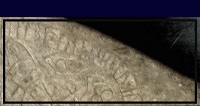“Its very variety, subtlety, and utterly irrational, idiomatic complexity makes it possible to say things in English which simply cannot be said in any other language.”
―Robert A. Heinlein, Strangers in a Strange Land
There are plenty of how-to blogs about writing–this isn’t going to be one of them. There exists a second wave of influences on the writer, whether apparent or not. The history of our language, the etymologies of words; our alphabets, the symbols we use to communicate our artistry; the neurological underpinnings of language, writing and creativity; how simply communicating our version of truth becomes persuasion; how poetry uses indirect language to express that which words normally cannot; how we preserve and transmit (and re-transmit) our history, both political and personal–all this and more can inform and deepen our writing.
I’m a researcher and a writer, in that order. I left graduate school a couple dozen years ago, but that was only ever the public version; in actuality the independent scholar never stops. When folks tell me I should write more I protest: But I’m still learning new things.
I love language. I’m fascinated by the symbols scratched on a page that we give meaning. I love the way words come together to create something that wasn’t there before. I studied writing, then literature, then discovered that writings conveying history were a linguistic art form of their own.
Dissecting modes of historiography has informed my current fiction writing, because I believe this is a model for the kinds of critical thinking sorely lacking today. But it’s also a way to appreciate poetic expression wherever it pops up.
I like to read well-written fiction, of course, often the kinds heavy on allegory and preachy with messages; lately Star Trek has come a long way with award-winning authors like David Mack and Kirsten Beyer.
But I also have a strong interest in reading (and a history in writing) non-fiction: history, travel, anthropology, neurology and linguistics, and lately some very good personal narratives from genealogy: “going home” to European roots. I’ve written bits and pieces of my own adventures in this field, but since I’m still in the middle of the adventure, I don’t know enough about how it will end to put it all together in a single volume. I’ll probably die with a bucket-list of places to visit and the world will just have to live without that particular book.
Currently I’ve begun writing a series, The Messengers.
The Messengers: the Painted Word – in an alternate-Earth, I explore a society held together practically and ideologically by the Order of Messengers, a class of para-military trained researchers who, you guessed it, traverse the Kingdom in the service of the business of the realm. Two novice Messengers address the sad disconnect that has grown between their discipline and the governance of the Kingdom and also the people–privately, then when they’re caught up in the very real crisis of succession after the murder of their ruler. They eventually delve deep into their society’s origins in order to bring resolution to the present dilemmas. There is social allegory here: a lament on the major influences on government at odds with the well-being of the people (I work in local government…) and the great rift between the people and all the great discoveries being made in science and the humanities (over-shadowed as they are by reality TV and social media). Not original, perhaps, but still relevant.
In The Messengers: the Buried Land I’m just beginning a story about a shared past between the Messenger Kingdom and a seemingly-unrelated country across the Sea. Allegorical themes I plan to explore include a wasteful-society vs. a conservation of resources and stewardship of the Earth (it folds neatly into the plot and sub-plot, thin as they are just yet). As in the first novel, I hope to make use of the Messengers’ knowledge of their arcane writing system and even older written artifacts in furtherance of the plot.
- Gabriella L. Garlock, Michigan



Hi! I saw your post on NaNo and thought I’d say hi. I love your blog so far! I’m also in love with history and your prospective is certainly interesting.
I also have my own blog (http://ravenspen.com)… you can check it out if you want, but no pressure!
I’m really looking forward to your next post!
HT
LikeLike
Thanks! I just published that first blog. Kind of cool to have a comment before I actually blogged anything…!
LikeLike
…I’ve commented on your blog with my real name–about ravens.
LikeLike
Pingback: About. . .what I write | HistoReWriter